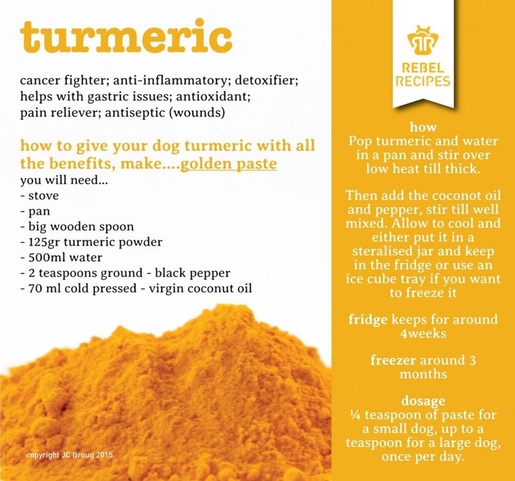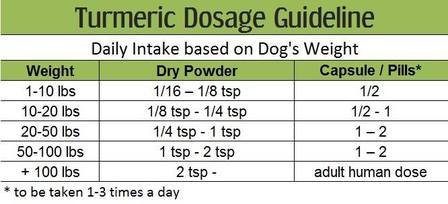LEAD DOG DESIGNS
|
Using Turmeric To Help Control Chronic Inflammatory Problems In Dogs
By Margit Maxwell The Normal Acute Inflammatory Response When bodies have an acute inflammatory response to an injury, infection, or a pathogen, this response is a normal and healthy part of the body’s healing mechanism. This kind of inflammation is not only normal, it is a necessary function of the healing process. It is the inflammation that triggers the body’s response for the blood and the T and B cells of the immune system to go to work on the affected body part to begin the process of repairing healing the trauma or disease. Short term inflammation that is directly a result of trauma or illness is seldom a problem when the body is able to heal the problem. But what happens when the inflammation cycle is chronic and a result of an immune system response that is an over-reaction to some imagined health threat? The Chronic Inflammatory Condition The kind of chronic inflammation of the body that comes from an immune system that is not functioning correctly occurs when a dog is suffering with in an autoimmune related disease. In these types of conditions, some component of dog’s immune system fails and can no longer reliably distinguish between a foreign invading pathogen that needs to be attacked and eliminated from the body and its own body cells. Specifically, in autoimmune disorders the immune system can no longer distinguish proteins that are part of the dog’s own body tissues or organs and see them as an invading outside force. The malfunctioning immune system then launches a “campaign” by producing antibodies that end up attacking and destroying the dog’s own cells as if they were invading outside pathogens. Health Conditions Created By Immune System Over Reactions According to Dr. Jean Dodd, for these dogs, the constant state of inflammation in their bodies causes an endless list of debilitating secondary health issues like: Chronic diarrhea with or without blood and loss of appetite (anorexic eating patterns); Muscle weakness, lethargy, depression and other mood and behaviour disorders; Chronically inflamed skin lesions, ulcerations, and issues with hyperkeratosis (an uncontrolled growth of external skin cells) with body odor that comes from infections; Nasal, oral, or any lesions of the body tissue; Inflamed joints causing pain from swelling; Chronic anemia; Seizures; Chronic weight gain or uncharacteristic aggressiveness (if related to thyroid disease). There are also several common medical conditions that have their roots firmly planted in an autoimmune induced health problems: Pemphigus Disease – produces ulcers that affect the oral cavity and skin areas bordering the mouth, nose, eyes, anus, and genitalia with the lesions progressing to involve greater and greater amounts of skin surface. Thyroid conditions like Hypothyroidism / Hyperthyroidism, Cushing’s Disease, and Myesthenia Gravis; Lupus; Arthritic inflammatory conditions; And even Cancerous conditions. The Allopathic Method Of Treating Autoimmune Diseases Human doctors and Veterinarians alike really don’t have too much understanding about how to shut off the attacks on the body caused by Autoimmune Disorders. There are currently many humans suffering with Autoimmune conditions such as Rheumatoid Arthritis, Lupus, and Fibromyalgia. Sadly, dog Autoimmune related illnesses are now beginning to be seen with some regularity. When immune systems under react to invading pathogens there are a number of ways to accomplish stimulating and supporting the immune system to bring it back to a balanced state of functioning. But when the immune system response needs to be dialed back, the classic way that Allopathic medicine addresses this is to administer steroids, used both internally and topically. Steroids really do nothing to cure the problem, they only serve to address and lessen the symptoms of the chronic inflammation. Long term steroidal use in dogs has much the same effect as long term use in humans. Using a steroid can causes secondary health problems like weight gain, swelling, aggressiveness behaviour, and a sluggish liver that could eventually lead to liver failure. So wouldn’t it be wonderful to have a natural product that could address the chronic inflammation attributed to Autoimmune Over Response without the side effects and health problems created by steroid use? The Anti-Inflammatory Properties of Turmeric Turmeric, a plant belonging to the ginger family, grows in South Asian tropical climates. The beneficial part of the Turmeric plant are the root of the plant where the active ingredient, Curcumin, is located. Curcumin is a polyphenol that works by addressing cell to cell communication to reduce inflammation. Turmeric root is a spice that is commonly used in Indo Asian cooking. It is either cooked, dried, and made into a powder or used fresh. Turmeric shares its colour with saffron and it too has a very distinct orange/yellow colour that is often used as a dye. Turmeric can be beneficial to aid with medical issues where there is inflammation by assiting in the cell to cell communication and turning off the release of antibodies from the cells and thereby reducing or even eliminating the effect of the inflammation. Additionally, Turmeric also contains a wide range of antioxidant, antiviral, antibacterial, antifungal, anticarcinogenic, antimutagenic and anti-inflammatory properties. It is also contains other beneficial and healthy nutrients like Vitamin C, niacin, Vitamin E, Vitamin K, potassium, calcium, copper, iron, magnesium, and zinc. Recipe For Making Golden Paste One of the best ways of extracting the benefits of Turmeric is to make something called a Golden Paste. In this recipe, the Turmeric is cooked with water and then pepper and coconut oil is added to make the paste. Pepper, or more accurately, the active component PIPERINE found in pepper is needed to help with the turmeric uptake in the body. Adding coconut oil not only helps to form the paste but the coconut oil aids absorption by adding fats to the recipe and coconut oil also has properties to help fight inflammation in the body. Coconut oil also helps to offset the binding (constipating) properties of Turmeric. When the Golden Paste is cooked it is placed into a clean jar and it can be kept refrigerated for up to two weeks. Golden Paste Recipe Into a cooking pot add: 1 cup or (250 mls) of water; Add ½ cup or (125 mls) of organic powdered Turmeric. On medium heat and stirring constantly bring mixture to a slow boil. Then to the boiling mixture add 1 ½ teaspoons or (7 mls) of ground black pepper; And add about 5 tablespoons or 70 mls of organic coconut oil to the cooking mixture. If your mixture appears to be too thick add some extra water 1 tablespoon at a time until the desired consistency is reached. If your mixture should be too watery, add more Turmeric 1 tablespoon at a time until the desired consistency has been reached. Mix until the oil has fully melted and all the ingredients are thoroughly blended. Allow the mixture to cool and pour into a clean jar. Keep refrigerated. The paste will keep for up to two weeks in the fridge. Dosages For Using Golden Paste Always start with small amounts when using a new product and work your way up to full doses. If your dog develops a belly ache from the Turmeric, reduce the amount of Turmeric given daily. Also make sure to give lots of water as Turmeric has natural binding properties. The average recommend dosages for using Golden Paste is approximately ¼ teaspoon per 10 pounds of dog weight. So that means for a 40 pound dog you are using 1 teaspoon daily, for an 80 pound dog you are using 2 teaspoons daily. You can divide these doses in half and give in two equal doses for the day. In the case of using Turmeric for Autoimmune inflammations, Dr. Karen Becker recommends the following amounts of Golden Paste to be administered daily: For small dogs to medium sized dogs: ½ teaspoon or (250 mgs) administered twice daily; For large dogs: 1 teaspoon or (500 mgs) administered twice daily; For giant dog breeds: 1 teaspoon or (500 mgs) administered three times daily. The dosages for using powered Turmeric and fresh Turmeric are the same as for using the Golden Paste.
0 Comments
Leave a Reply. |
AuthorMargit Maxwell- A Dog Trainer (CPDT) and Canine Behaviour Specialist for The Divine Dog Project. She lives in Calgary, Alberta, Canada with her Herd of two Siberian Huskies (Kaya and Angel) and an Alaskan Malamute (Skylar). She also has credentials in Psychology (Human and dog), Animal Sciences, Natural Medicine, Energy Medicine, and many alternative Healing Modalities. Archives
February 2021
Categories
All
|
Shop |
Company |



 RSS Feed
RSS Feed
